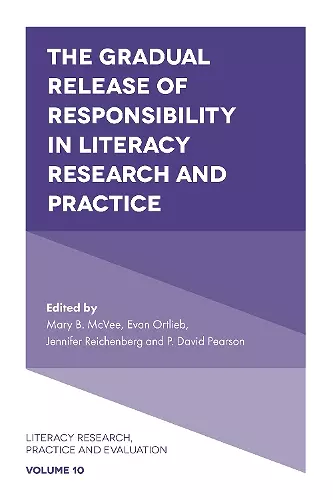The Gradual Release of Responsibility in Literacy Research and Practice
Professor Evan Ortlieb editor P David Pearson editor Jennifer Reichenberg editor Mary McVee editor
Format:Paperback
Publisher:Emerald Publishing Limited
Published:26th Aug '19
Currently unavailable, and unfortunately no date known when it will be back

Educators are always in search of approaches that promote student development and academic achievement. Engaging learners in purposeful instruction in skills and strategies is a cornerstone in every classroom. The gradual release of responsibility (GRR) model requires the responsibility of learning to shift from being teacher-centric towards students gradually assuming responsibility as independent learners. In the last 35 years, the gradual release of responsibility model of instruction has become synonymous with some of the most effective approaches to teach both skills and content to students of all ages. Evidence-based practices have been documented across the globe not only in literacy but also in most disciplines across the curriculum. While the GRR model is a well-established theory, its implementations have not been researched. This edited volume discusses how the GRR model evolved and has been applied, how it benefits learners and teachers, and how it can be utilised for years to come. By looking not only at the gradual release of responsibility model from a theoretical standpoint but also the research and practice of this approach, this book will prove invaluable for educational leaders and researchers alike.
This volume compiles 16 chapters by researchers from the US and New Zealand, who examine the gradual release of responsibility model and its use in literacy research and practice. They describe the historical and conceptual origins of the model; how children expand independence within instructional interactions with teachers and how scaffolding is understood and applied; how to develop inquiry-based learning environments in subject area classrooms to support students' capacities for deep and intellectually engaged reading; the importance of thinking flexibly about the gradual release of responsibility during the implementation of an explicit strategy instruction model; the relationship between school leadership and quality core instruction, as defined by a gradual release of responsibility framework; gradually releasing responsibility and youth participation in a social justice literacy workshop; and researcher-led follow-up activities during an early childhood reading lesson aligned with a gradual release of responsibility model with emergent bilingual students. Others discuss how the model can support bilingual teachers' implementation of dialogic reading comprehension instruction in small groups and linguistically responsive literacy instruction with emergent bilingual students; how the model has been used in research and educational practices related to deaf or hard of hearing children; agentive and sustainable teacher development as part of literacy coaching using a reflective framework and video within a gradual release of responsibility as apprenticeship stance; the use of the gradual release of responsibility to develop students' knowledge and use of science language and conceptual knowledge; the use of the model in writing instruction; its application to the reading comprehension of students in elementary classrooms; its use as an instructional framework for culturally relevant literacy pedagogy; and the historical context of the model and its continuing evolution. -- Copyright 2019 * Portland, OR *
ISBN: 9781787694484
Dimensions: 229mm x 152mm x 15mm
Weight: 550g
280 pages